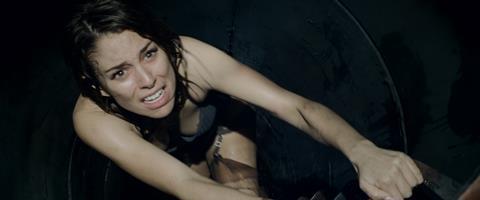Alex de la Iglesia returns with an unflattering genre piece set inside a Madrid bar

Dir. Álex de la Iglesia. Spain. 2017. 102 mins
Midway through Álex de la Iglesia’s full-throttle genre romp, two of the characters speculate as to whether fear brings out the worst in people or whether it reveals who they really are. Either way, this is a singularly unflattering portrait of the human condition. A final act in which the key characters find themselves grappling in raw sewage provides a fitting metaphor for society, or perhaps for the screenwriting process.
The lack of originality in the premise is compounded by a screenplay which takes narrative liberties
The Bar is hardly the first film to use the ‘strangers imprisoned in a small space by an unknown threat’ device: the director cites Assault On Precinct 13 as a direct influence. And the lack of originality in the premise is compounded by a screenplay which takes narrative liberties – a character who just happens to be carrying a gun, numerous motiveless killings – in order to keep the tension on a par with the gross-out element. De la Iglesia’s name and reputation as a genre director could create interest within niche audiences. The film’s lurid, B-movie approach could possibly make it a natural fit for midnight movie slots in festivals where his last, Witching and Bitching, eventually found a tentative home. But it is unlikely to generate the word of mouth momentum required for cult movie theatrical success.
The action unfolds in and around a small neighbourhood bar in Madrid. Glamorous Elena (Blanca Suárez) has stopped in to charge her phone on her way to a date in a boutique hotel. Nacho (Mario Casas), a bearded hipster who works in advertising, is plugged into his iPad and oblivious to the world outside. Amparo (Terele Pávez) is the gravel-voiced barwoman keeps the bickering regulars in line. Among them is Israel (Jaime Ordóñez), a street-sleeping alcoholic with mental health issues which evolve and manifest whenever the film is in need of a device to move the plot forward. This is perhaps the most problematic and irresponsible element of the film: Israel goes from being a victim to a threat by virtue of his unpredictability and acute mental illness and not much else.
Then a customer leaving the bar is shot dead; the one person who goes to his aid also ends up with a bullet through his head. And while the rest of the clientele panic noisily, the two bodies disappear without a trace. It doesn’t take long for the bar customers to start blaming each other. As the infighting gathers pace, they form into factions. Elena and Nacho, being of commensurate hotness, band together; two of the older male regulars form a united front against the suspicious strangers in their midst. But then a dying man with milky, bulging eyes is discovered in the restroom, bleeding from the ears and teeth and pleading with them not to touch him. And the characters pick up on what the audience had already guessed, courtesy of a grisly germ-laden title sequence: a deadly disease outbreak is underway.
Frenetic in everything, from its pacing to its dialogue delivery, the film conveys an uncomfortable sense of claustrophobic anxiety, thanks to the restless editing and caged-animal camerawork. The ubiquitous score is pitched somewhere between Hitchcockian paranoia and disaster movie meltdown. The impressively horrible work from the special effects make-up team ensures that the film is notable for its unflinching depiction of erupting pustules, if nothing else.
Production company: Pokeepsie Films, Nadie es Perfecto, Atresmedia Cine
International sales: Film Factory Entertainment info@filmfactory.es
Producer: Carolina Bang, Kiko Martínez, Mikel Lejarza, Mercedes Gamero, Álex de la Iglesia
Screenplay: Jorge Guerricaechevarría
Cinematography: Ángel Amorós
Editor: Domingo González
Production design: José Luis Arrizabalaga, Arturo García
Music: Joan Valent, Carlos Riera
Starring: Blanca Suárez, Mario Casas, Carmen Machi, Secun de la Rosa, Jaime Ordóñez, Terele Pávez, Joaquín Climent, Alejandro Awada






![The Brightest SunScreen[Courtesy HKIFF]](https://d1nslcd7m2225b.cloudfront.net/Pictures/274x183/3/5/0/1448350_thebrightestsunscreencourtesyhkiff_312678.jpg)












![The Brightest SunScreen[Courtesy HKIFF]](https://d1nslcd7m2225b.cloudfront.net/Pictures/100x67/3/5/0/1448350_thebrightestsunscreencourtesyhkiff_312678.jpg)





No comments yet